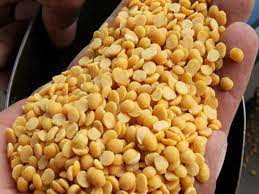Central government slashes import duty on tur from 11 per cent to zero per cent
By Lokmat English Desk | Published: March 6, 2023 01:53 PM2023-03-06T13:53:44+5:302023-03-06T13:57:42+5:30
In view of the rising prices of tur and tur pulse (pigeon pea) in the country, the Central government ...

Central government slashes import duty on tur from 11 per cent to zero per cent
In view of the rising prices of tur and tur pulse (pigeon pea) in the country, the Central government issued a notification on March 4, slashing the import duty on tur from 11 per cent to zero.
Secretary of the Wholesale Grain and Seeds Merchants' Association, Pratap Motwani said that given the weak production of tur this year and the possibilities of strengthening the prices in the long run, the government agencies will buy tur in Karnataka at the market rate and on some centres in Maharashtra and Gujarat after Holi.
In retail, the phatka tur was sold at Rs 125 to Rs 130 per kg. As the government was worried about the rising prices of Tur pulse during the festivals, the Central Government issued a notification on March 4 bringing down the import duty from 11 per cent to zero per cent.
At present, the price of Sudan Tur at Mumbai Port is Rs 7950 to Rs 8300 while African Light Tur is priced at Rs 6100 to Rs 6750. Now the effect of the fall in the price of tur will be seen when the market opens on Monday.
According to one source, sales of tur may be affected in the coming days Customers will be affected due to festivals, holidays and March end.
So prices may also decrease, but by and large, their prices would go up because the local crop is weak and many state governments are also going to buy tur from open markets.
There is a lot of time in the next harvest to balance the supply in the country; hence, the dependence on imports will increase, Motwani informed. Apart from the festival season, incessant rains through the months of August to November also hit the production of tur and brought down its quality as attacks of pests and diseases increased and tur plants were uprooted in the field itself.
The high moisture content also resulted in the deterioration of its quality.
Open in app